Car Audio Capacitor vs Battery
by Chris Lewis.
One of the most common questions people have about car audio is which is better for powering their system: a capacitor or a battery? In this post, we'll take a look at the pros and cons of each option so you can make an informed decision. Ready to get started? Let's go!
Contents
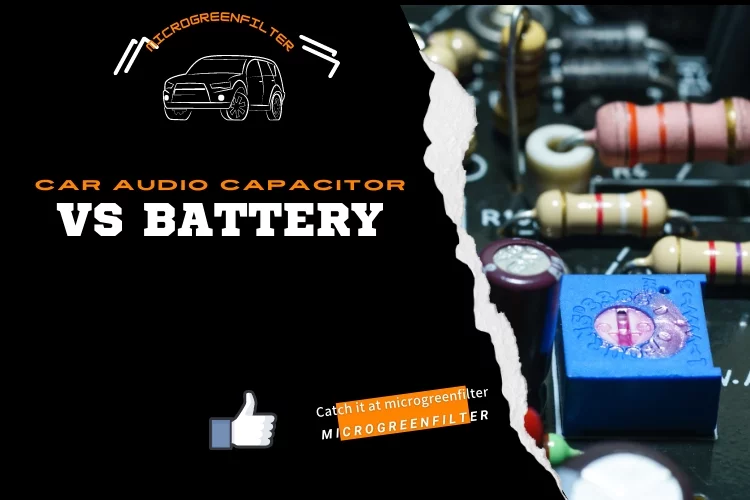
A Car Audio Capacitor
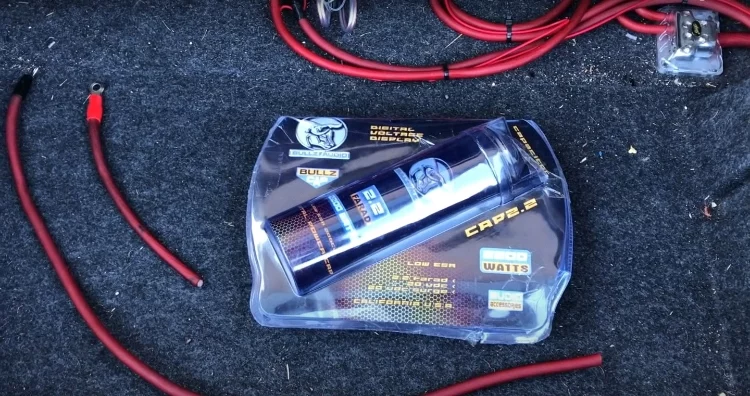
A capacitor is a device that can store energy in an electric field. "Charging" the capacitor means that we are transferring energy into it, and "discharging" it means that we are draining its stored energy.
This concept of the capacitor has many practical applications in electrical circuits. One application is as a replacement for batteries in some cases where a battery would be too big or have too long a recharge time. In this case, the capacitor can store enough energy to allow a certain type of circuit to function for a short time.
The most important feature of a capacitor is its ability to "pass" DC (direct current) and block AC (alternating current). A capacitor works by passing DC through it, but when AC is applied to it, the capacitor blocks the flow of current. It therefore acts like an open circuit for AC.
When a capacitor is connected in series with a source of DC voltage (a battery) and also across an inductor (coil), this combination is called a "RC filter." This device is a type of electronic filter circuit. It blocks AC, but allows DC to pass through it. The capacitor charges up when the voltage from the source exceeds that across itself and this causes a rapid increase in current through the inductor.
Recap of Terms:
- Charging (a capacitor) = transferring energy into it
- discharging (a capacitor) = draining its stored energy
- These are the most important features of a capacitor. The ability to "pass" DC and block AC.
The car audio capacitor is used to store electricity. It temporarily stores the energy and when the need arises supplies the energy to the amplifier. The best thing about a capacitor is that it can charge and discharge easily and quickly. However, the capacitor does not provide extra power but will come to rescue the system when the need arises. Its role is to stabilize the audio system by providing the required voltage at the time of need.
It mainly supplies consistent voltage to stabilize the car performance. Plus, it also helps to reduce the occasional dimming of headlights and window sliding. Overall a capacitor is responsible for high voltage issues that need prompt energy supply.
A Car Battery
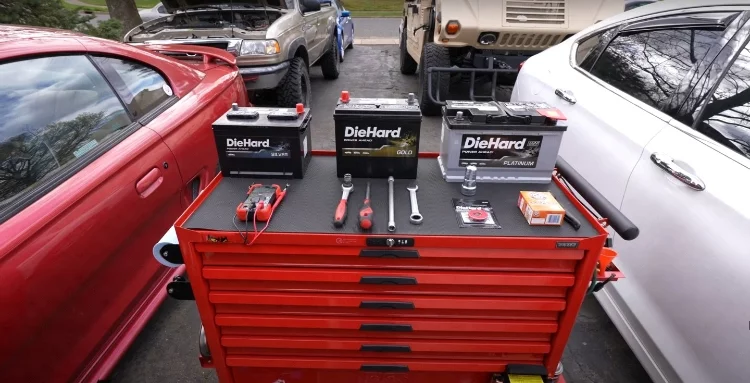
A car system needs a battery to double its power system. The battery has extra electricity storage to improve the car performance and to feed the amplifier. You can also fix it near the car's amplifier and it will reduce the window sliding and headlights problems. Moreover, you can add an extra battery or you can upgrade the old one to improve the power supply. The reserve battery voltage will feed your audio system and it will work to its full capacity. However, the battery is a permanent solution to your power shortage as it can rectify many issues associated with a shortage.
A car battery is a rechargeable battery that supplies the necessary electricity to start the engine of an automobile and to enable it to run once it is started.
Car batteries are usually lead-acid type, in which the positive electrode is made using lead metal strips swabbed with sulfuric acid, and the negative electrode uses porous carbon soaked in the acid. This is a type of lead-acid battery, and it can supply a relatively large current for a short time.
A car will typically have two separate batteries, one battery powers the starter motor to crank the engine and start the car, while the second powers electric devices such as lights from the beginning of motion or when everything electrical must be switched on before cranking starts (ignition switch positions: off-starter). In an ordinary car, these will usually be 12 volt lead-acid batteries; other ratings are possible but less common.
The energy stored in starting batteries is used by moving engines only for a short period of time - typically ten seconds or less during normal starting operation. The battery which supplies this power is a starting, lighting and ignition (SLI) battery.
Difference between an Audio Capacitor and a Battery
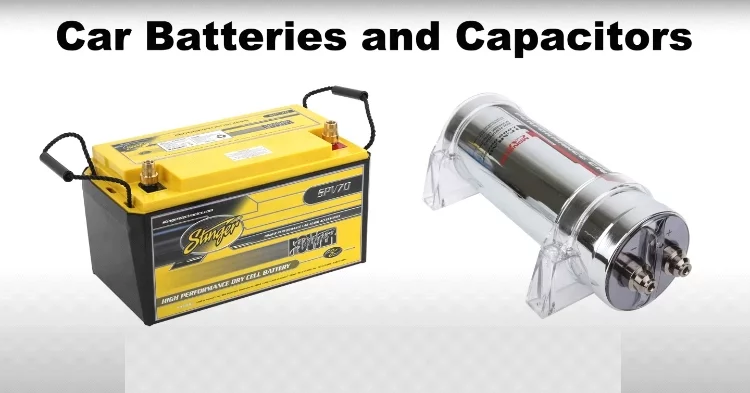
Both battery and capacitor have the same goal and purpose. But there are a few differences regarding the way they work. These differences can help you decide what to choose for your car.
1. Functionality:
The difference between the two lies in the way they work or function. The capacitor uses an electrical field to store the potential energy which requires space. While a battery stores its potential energy in a chemical form. This chemical storage provides more density which allows a battery to be smaller in size. These smaller batteries can produce the same amount of energy as a capacitor. So the small size of the battery becomes a plus point.
2. Energy release:
The energy released from the battery is not rapid thus it will not provide a sudden supply. It can only provide a continuous flow of energy that is not high voltage. But, the energy released from the audio capacitor is more rapid and will provide a rapid supply to the amplifier to fulfil its energy needs. The sudden interruptions will need an instant and high power solution that only a capacitor will provide.
3. Cost:
Both these options have a different cost depending upon the type of battery and capacitor. But in general, the capacitor is costly as compared to a battery. Because you need to pay the installing fee too in case you opt for a capacitor. So, the cost-effective way is to replace or upgrade your battery. You will already be paying a hefty amount for the high-end audio system.
4. Need:
The difference between the two also depends upon their need. On one hand, you will need a capacitor if your car system acts up only occasionally. As capacitor can only provide power for a few seconds and can not supply voltage for a continuous shortage. For instance, if your car is in idle mode, the car will provide less power and in turn, other systems will face a shortage of energy. During this issue, your car will need a capacitor as the shortage issue is temporary.
The battery, on the other hand, is for a continuous shortage of voltage. You can opt for a new battery if you frequently face dim headlights and audio system problems. The battery can rectify permanent and long shortages.
5. Music type:
If you like bass and heavy music, your audio system will require more power instantly. For this, you would need a capacitor that can provide instant and high voltage. While for soft and low music you would not face instant shortage and the battery would suffice.
6. Installation:
The Installation of both needs expertise but you should have more technical information while you are installing a capacitor. If you don't have the required information you can mess up the installation and cause problems. On the other hand, a battery does not need more expertise and higher technical knowledge and you can install them easily.
Pros and Cons of Car Audio Capacitor
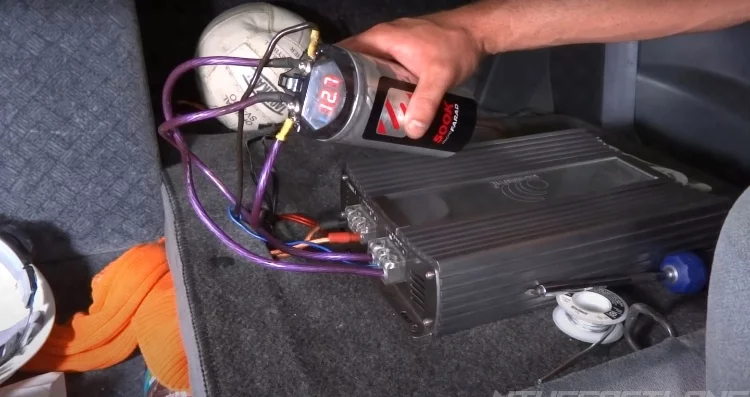
Pros:
- The main advantage of a capacitor is its instant and high power supply in the hour of need
- It can reduce the issues of dim headlights occasionally
- You can charge them and they will charge fastly as compared to batteries
- We can place them near the amplifier which will result in a lesser voltage drop
- An audio capacitor has a long life as compared to a battery
- It has a great temperature performance
Cons:
- The biggest disadvantage is the higher cost of a capacitor as compared to the battery while they both do the same task
- They are a misfit for cars with less space, as they are larger in size as compared to the battery due to less storage density
- A capacitor needs to be fully charged to be able to start performing. That makes the system malfunction as the capacitor will be competing with the amplifier for energy while it is charging
- It can also take away power from the subwoofer
- Capacitor Installation is a technical task and requires more technical information as compared to battery installation. Which makes it hard to install and there is always a chance of an error
- The capacitor needs an alternator to charge, which can create another task for the already exhausted alternator.
- The capacitor has a high ratio of self-discharge
Pros and Cons of a Battery
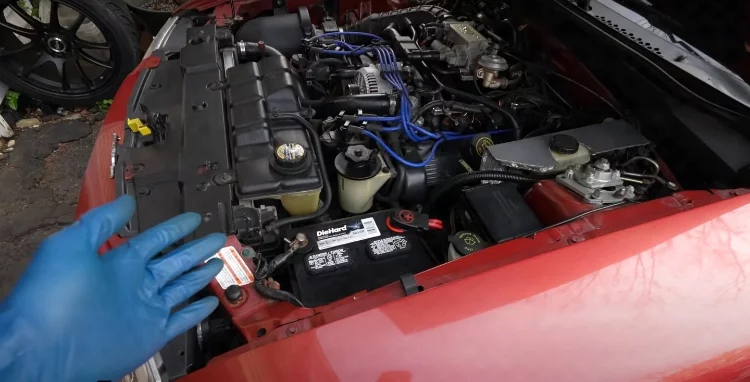
Pros:
- Installing a battery is a cost-effective task and requires a lesser amount of money as compared to the Capacitor.
- A battery will provide the same energy as that of a capacitor but its size will be smaller as compared to the size of the capacitor.
- A battery can provide voltage for a longer time as compared to the Capacitor. Plus, in addition to fixing headlights, they can resolve more serious and permanent energy shortage issues.
- A battery not only resolves dim headlights but also provides power for other performance issues. As it will act as a permanent powerhouse.
- You can easily find batteries everywhere and they come in several different sizes.
- An additional battery can act as a more permanent solution for frequent power shortages as they not only reduce the issue but also eliminate them completely.
Cons:
- The low quality and cheap batteries can leak out their chemical storage and can damage the Interior. Plus, there is always a chance of corrosion.
- The engine will have to charge the extra battery and that will exhaust and strain the engine.
- They have a shorter life cycle as compared to the audio capacitor.
- They have current and voltage restrictions which show they have less voltage and can not rectify high voltage issues.
- They take more time to charge.
- Unlike the capacitor, they are temperature sensitive.
Audio Capacitor vs Battery
For a quick review please see the table below so that you can get a better idea about both options.
| Audio capacitor | A battery |
|
|
|
|
|
|
|
|
|
|
|
|
|
|
FAQs for Car Audio Capacitor vs Battery
Why Do Cars Need a Capacitor or Battery?
The reason is simple; your car battery is not powerful enough to support car systems and your powerful audio box. This power shortage can cause the dimming of headlights or the window rolling. You need to install a car audio capacitor or a battery to rectify these problems. Here confusion arises as to what you should install to improve the power supply. Both audio capacitor and battery have their pros and cons and you should select the one that suits you the best.
Conclusion
A capacitor stores energy in an electric field. When voltage is applied, the capacitor will discharge all of its energy at once. This makes capacitors a great choice for high-power applications like car audio systems. Car audio capacitors are used to improve sound quality and bass response by providing a burst of power to the speakers when they need it most. A battery, on the other hand, stores energy in a chemical reaction between two electrodes and an electrolyte. Batteries can release or absorb this stored energy over time, making them perfect for devices that need a steady stream of power like laptops or cell phones. Car audio capacitors are becoming more popular every day as people look for ways to improve their music listening experience.
 |
 |
 |
 |

About Chris Lewis.
Chris Lewis is a passionate individual with a deep affinity for the world of automobiles. From a tender age, his fascination with cars was nurtured by his father, a seasoned mechanic based in the vibrant city of San Francisco. Growing up under the watchful guidance of his skilled father, Chris developed an early aptitude for all things automotive.
Thoughts on "Car Audio Capacitor vs Battery"
 |
 |
 |
 |
Get FREE Filters now. Or latest free tools from our best collections.
Disable Ad block to get all the secrets. Once done, hit any button below
 |
 |
 |
 |